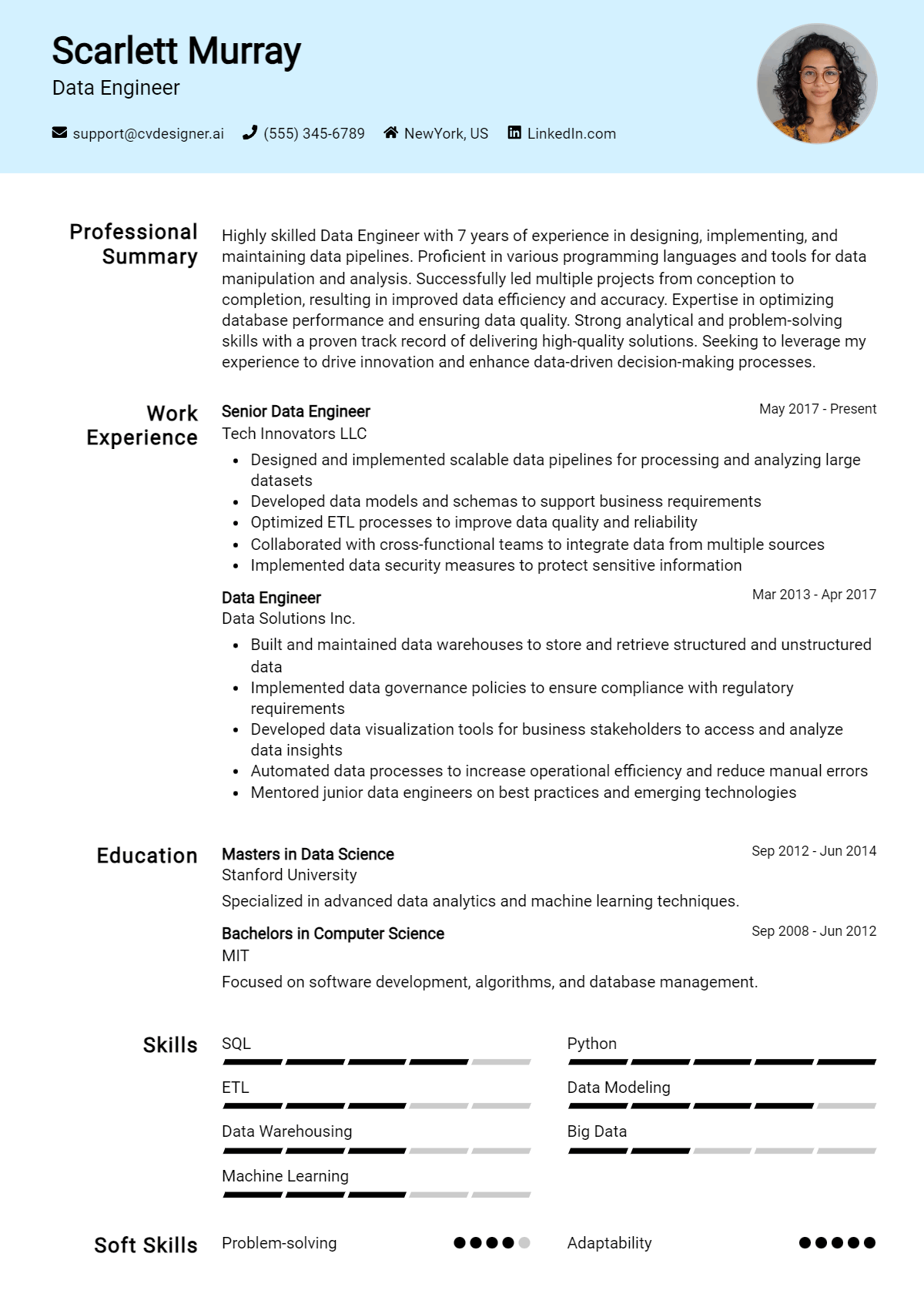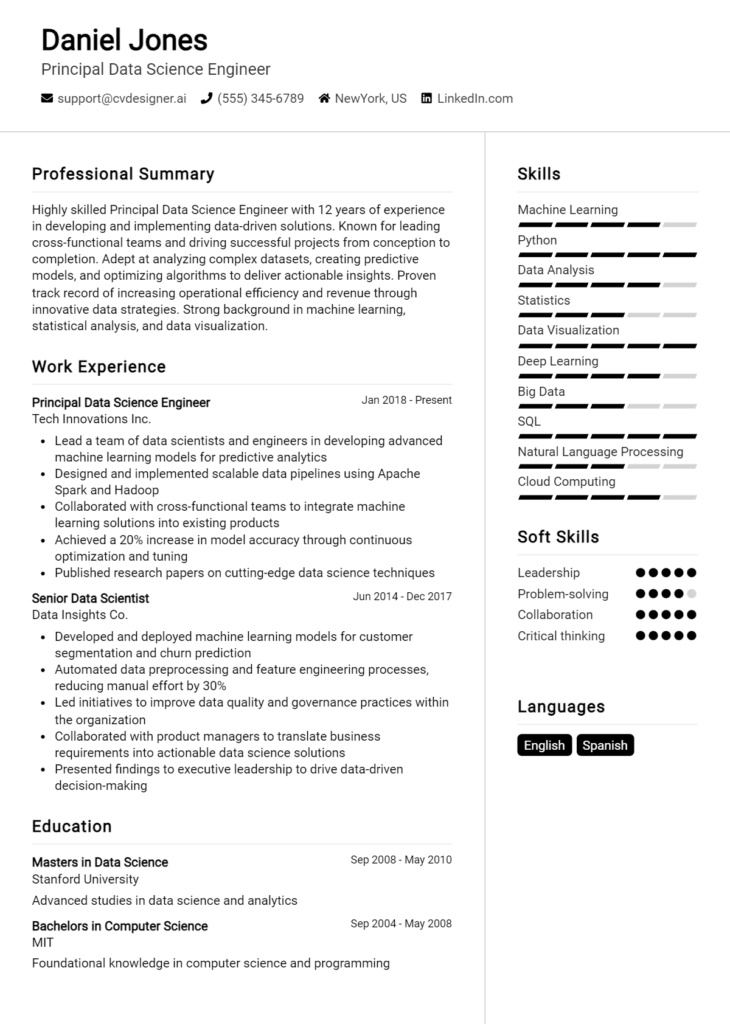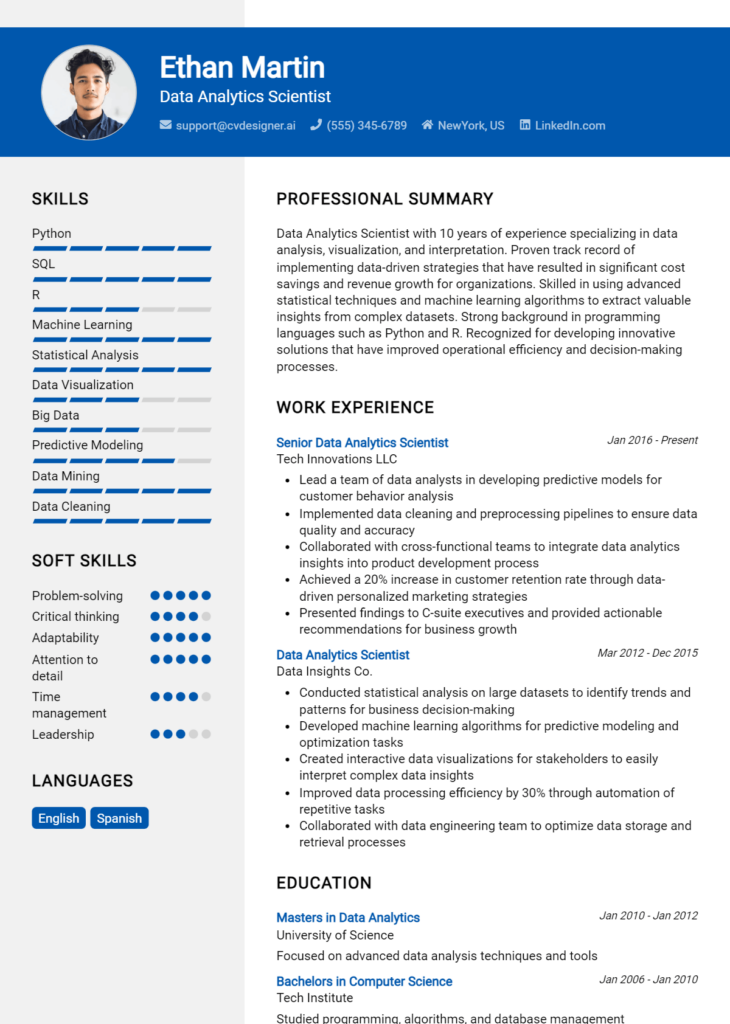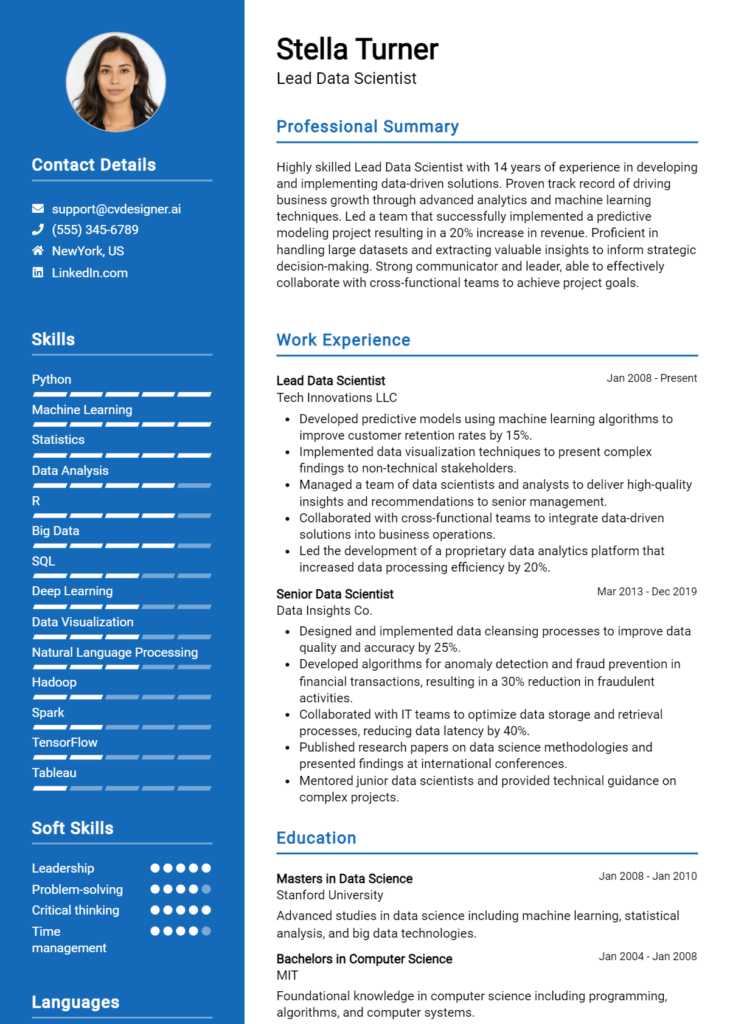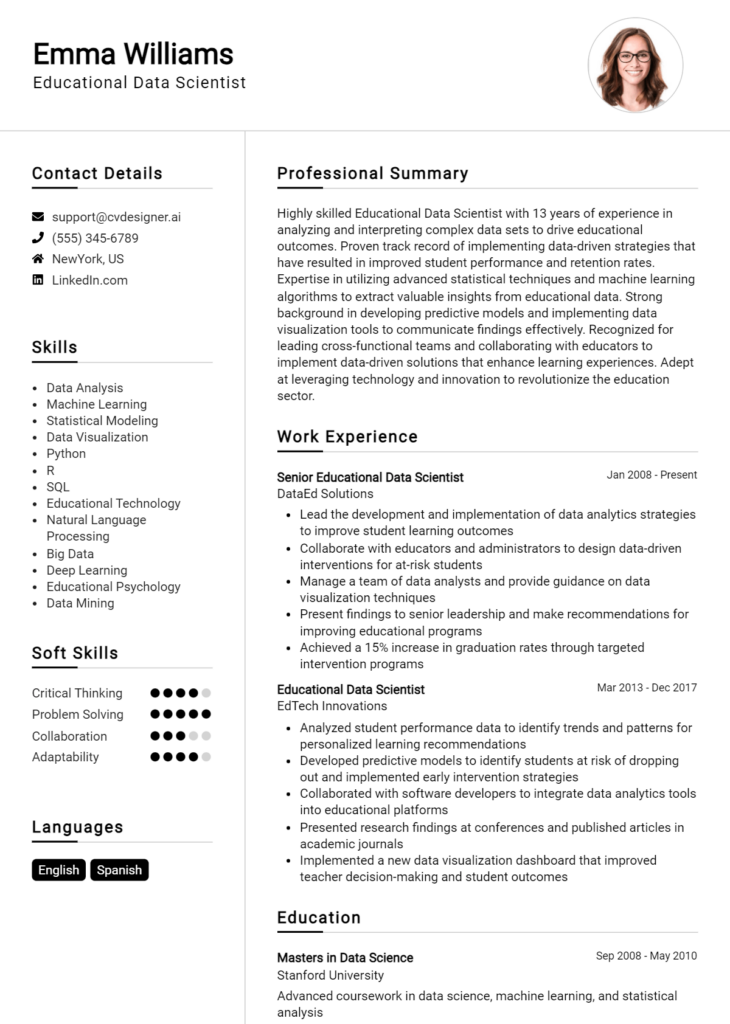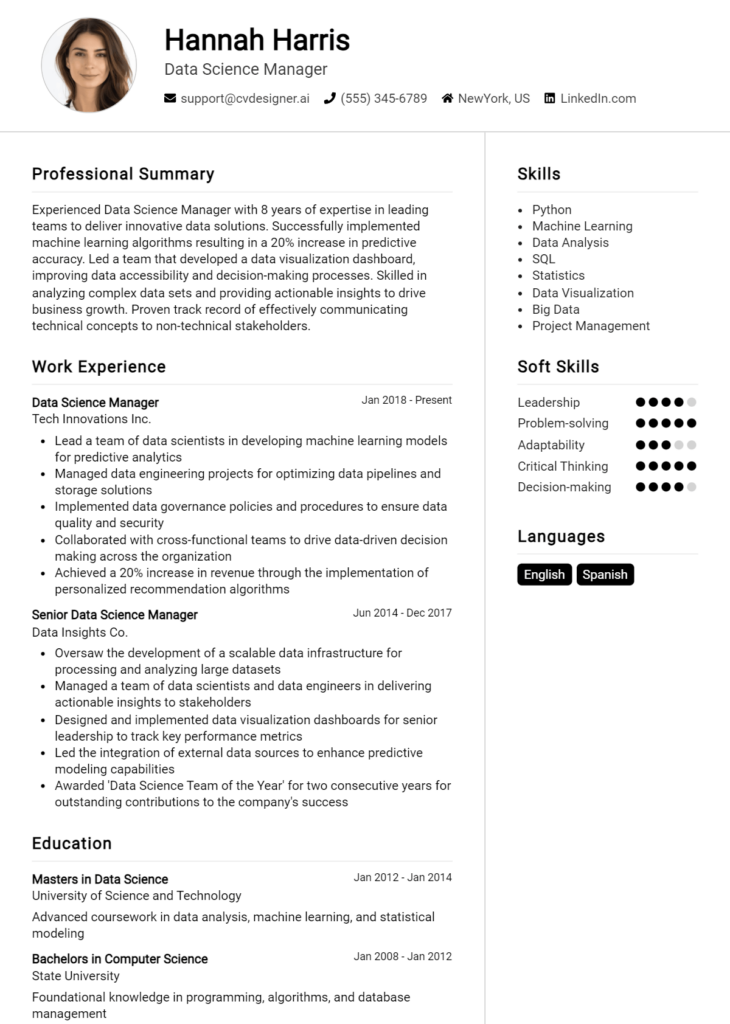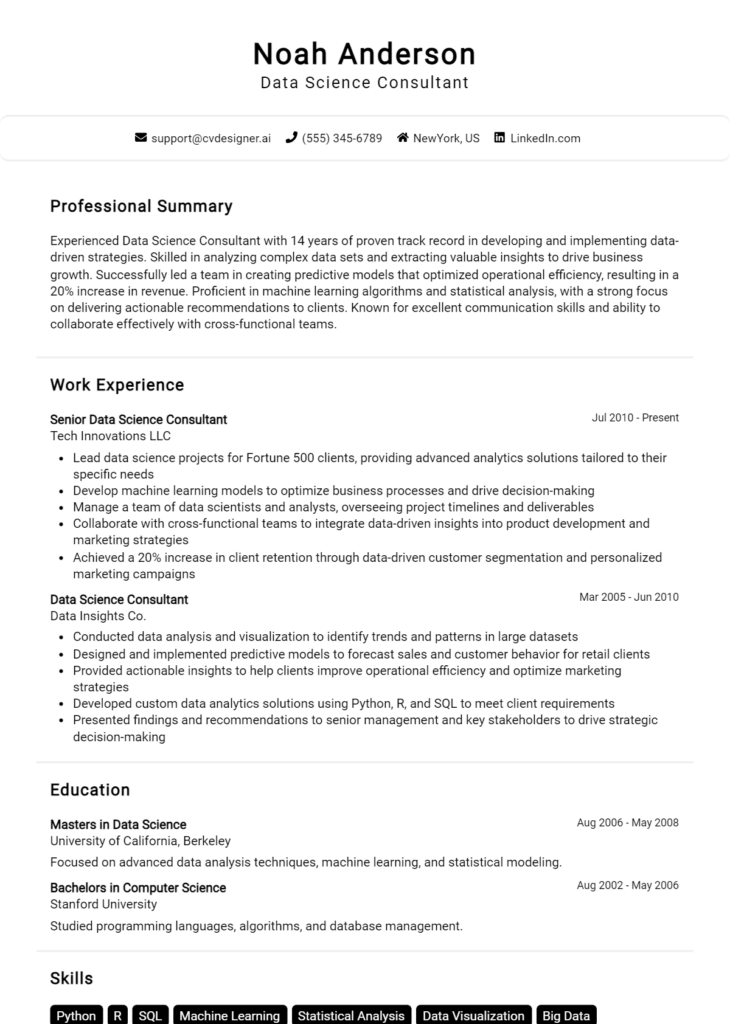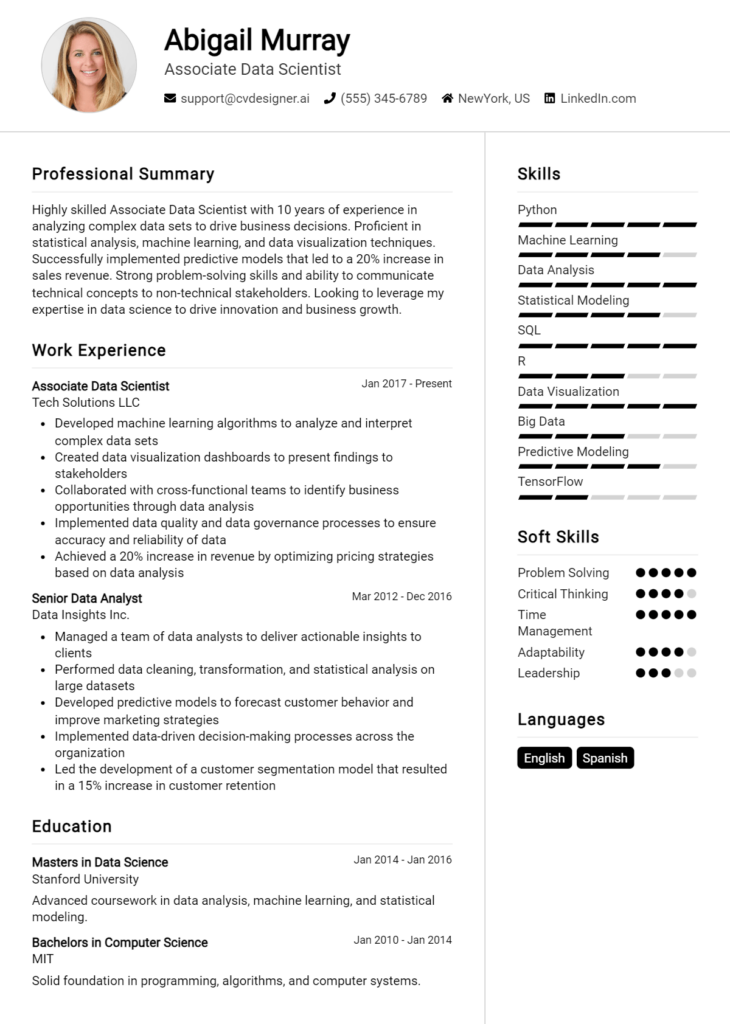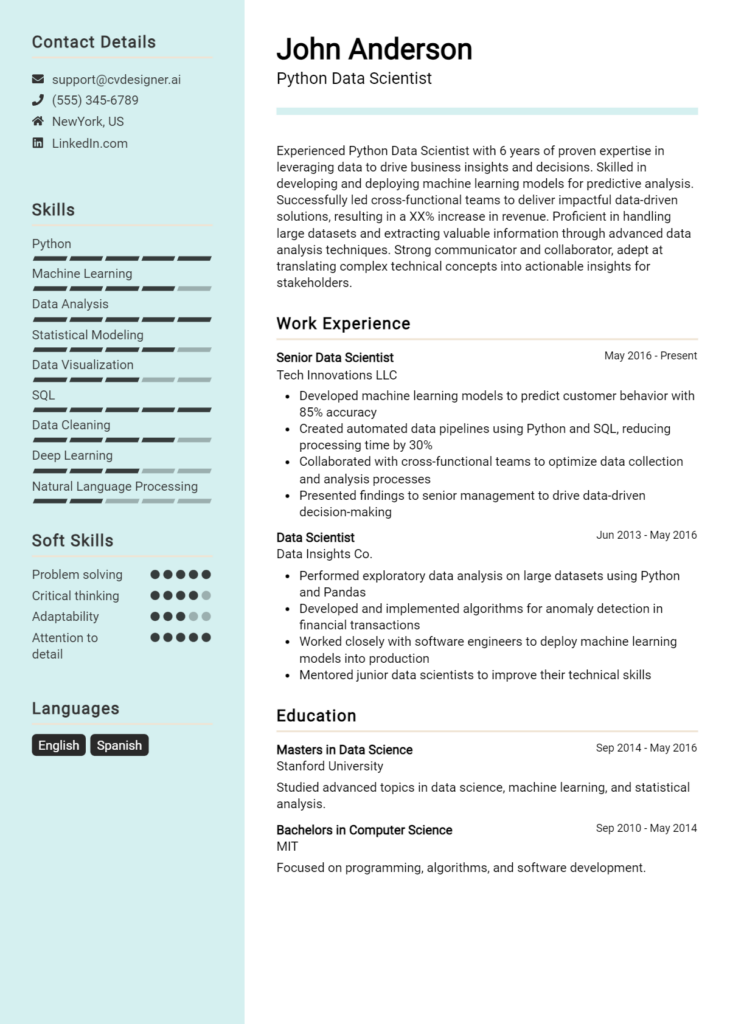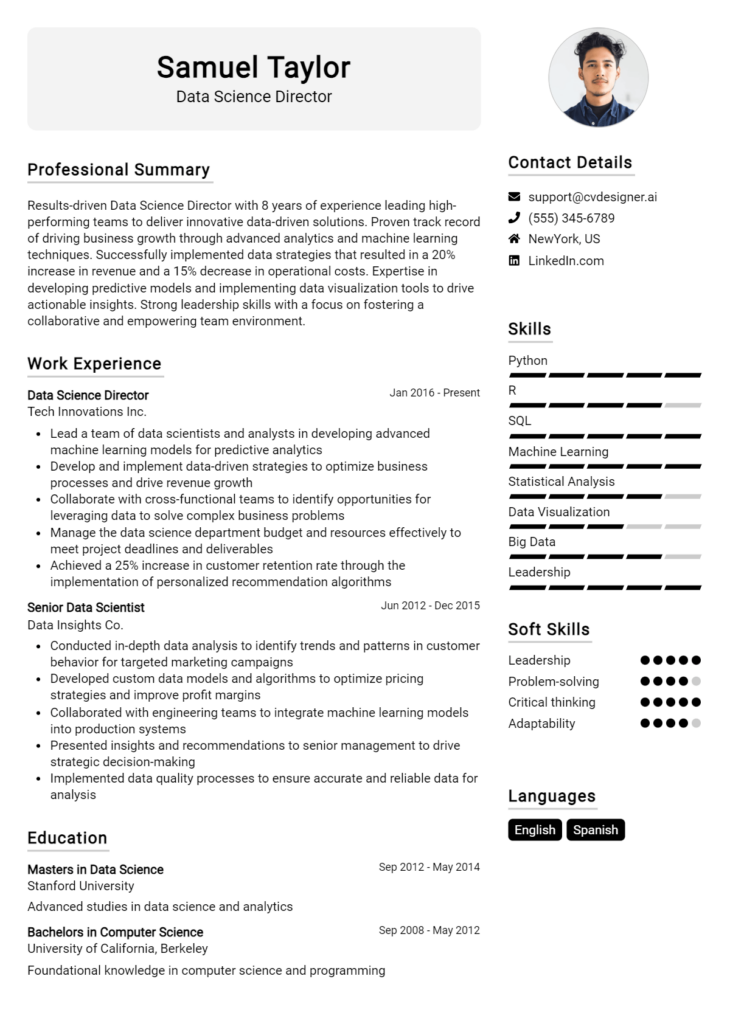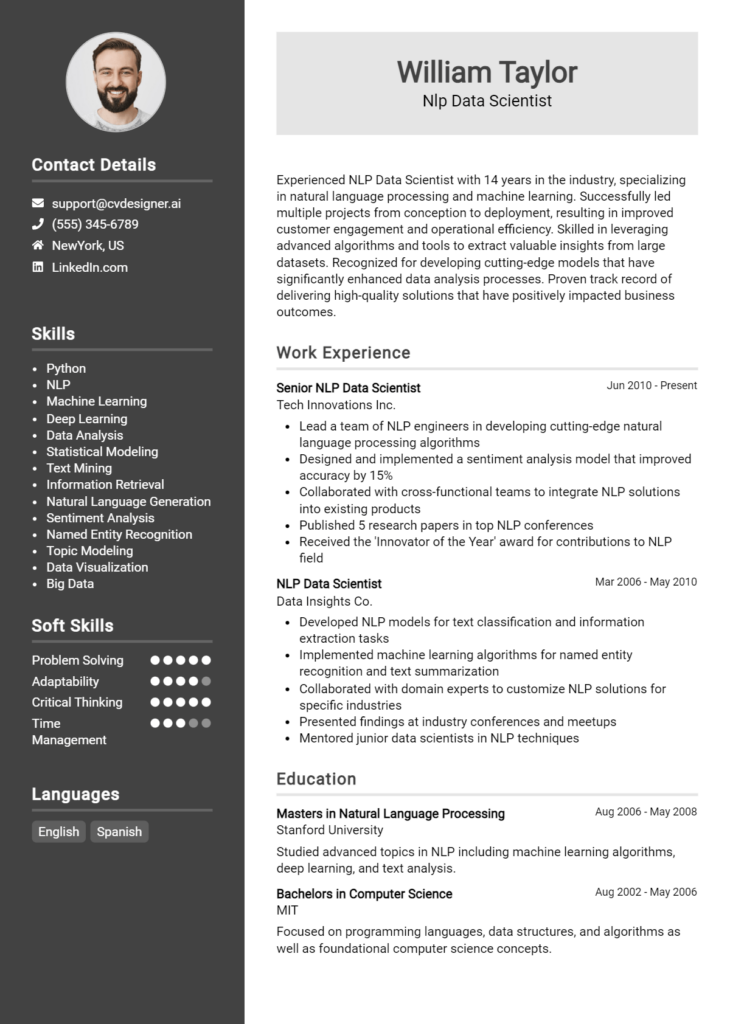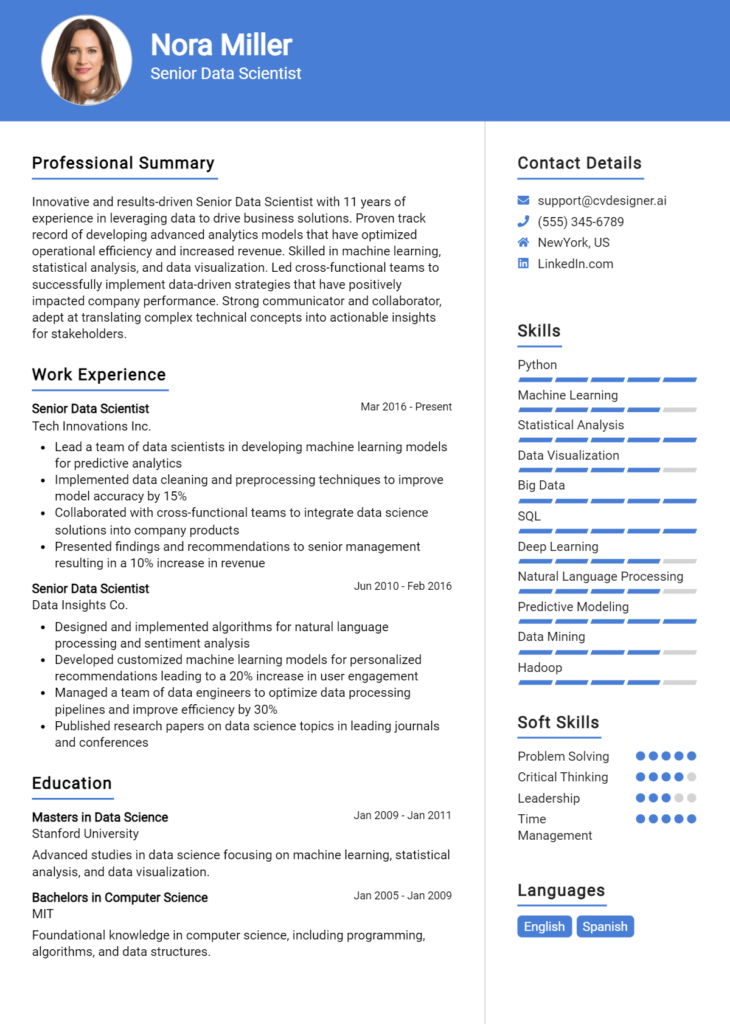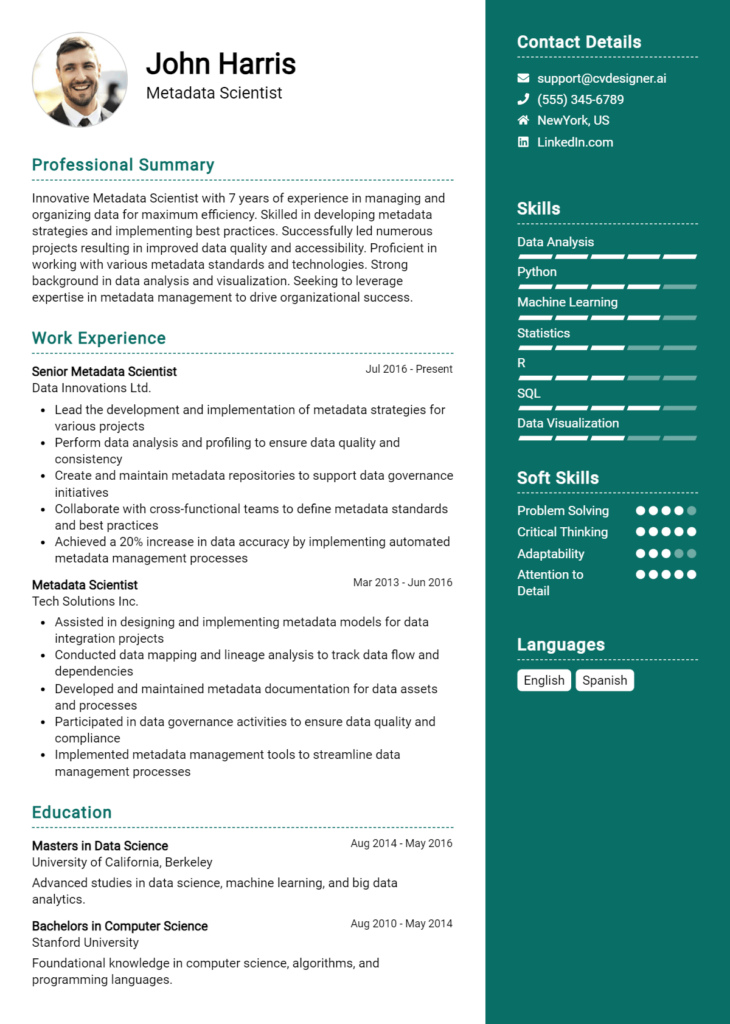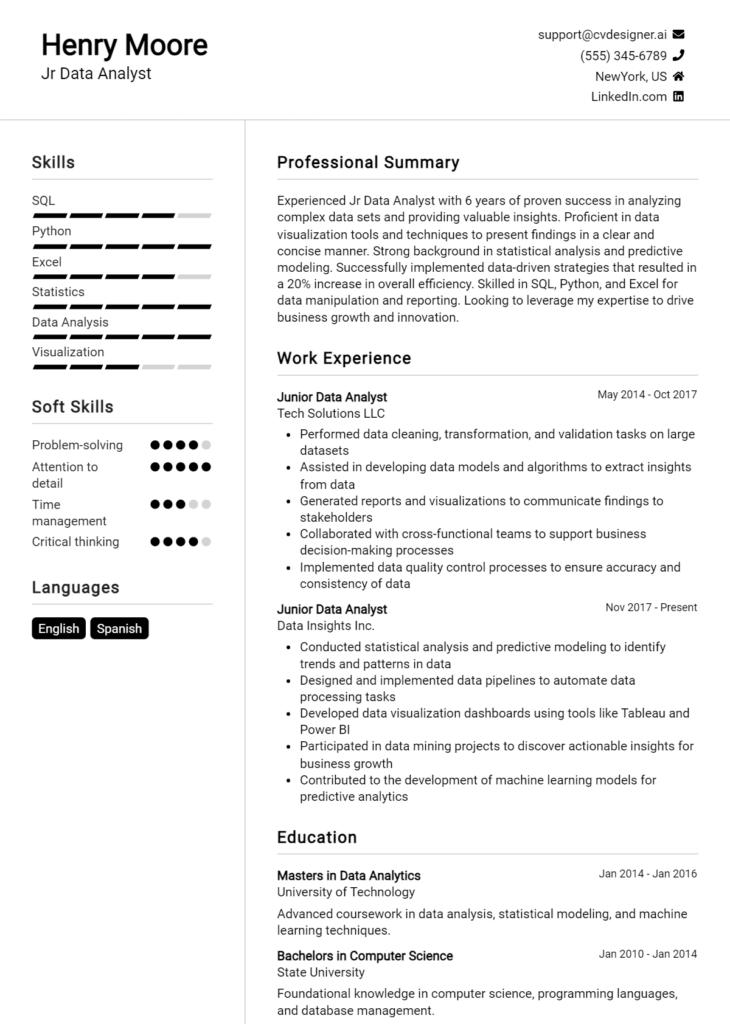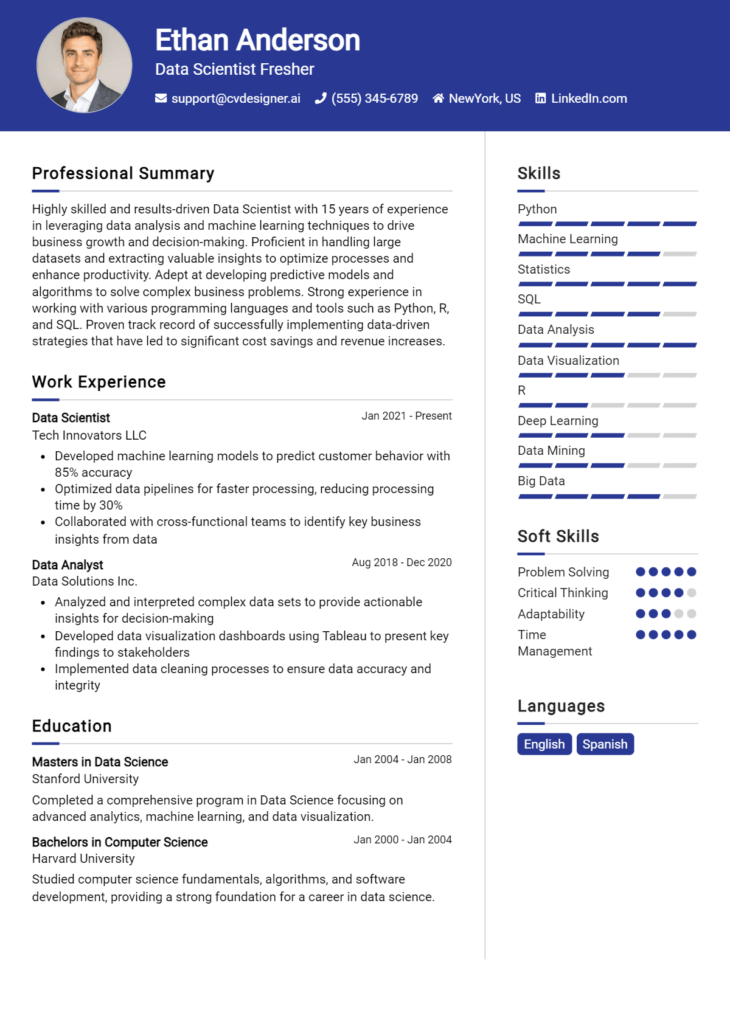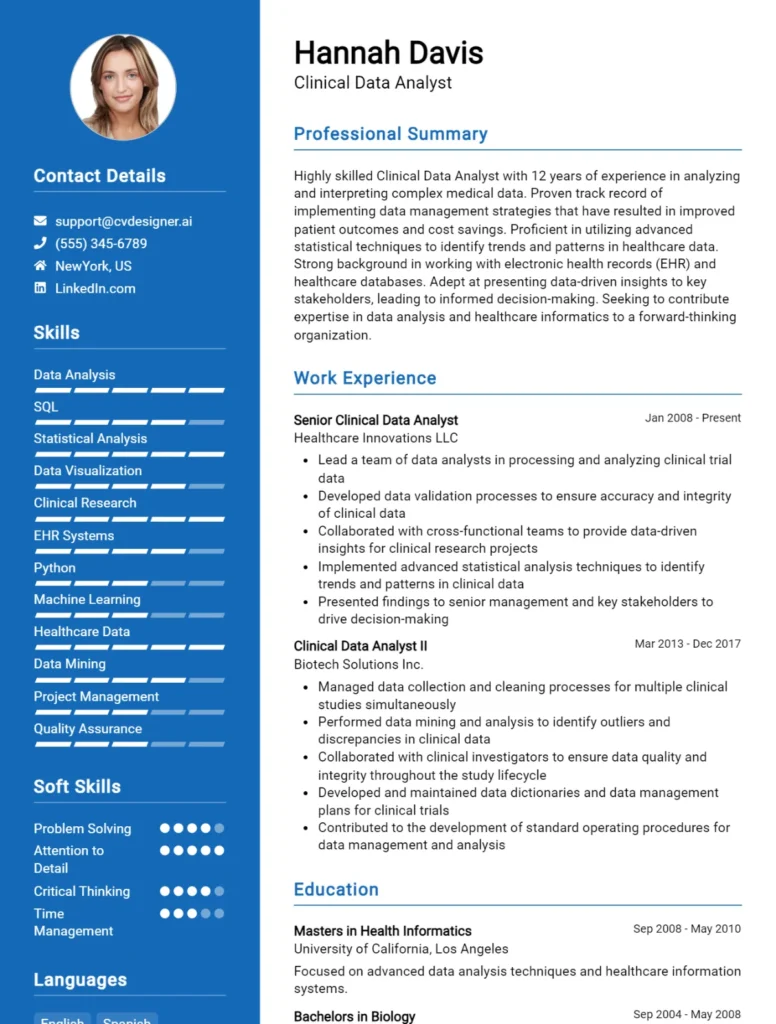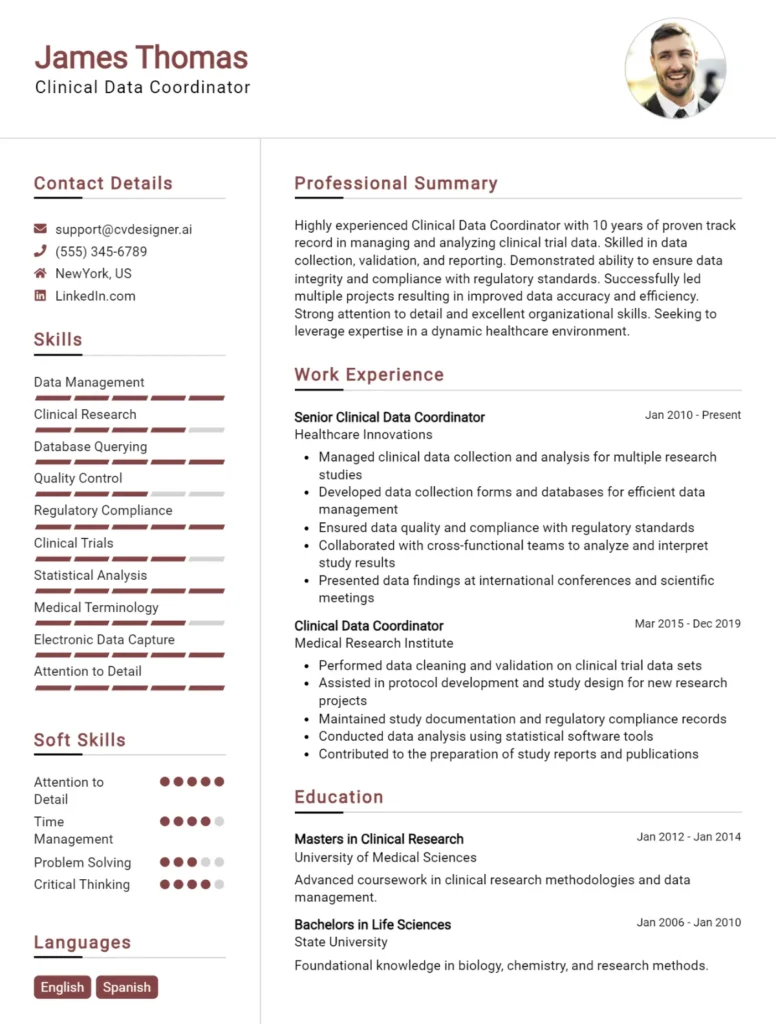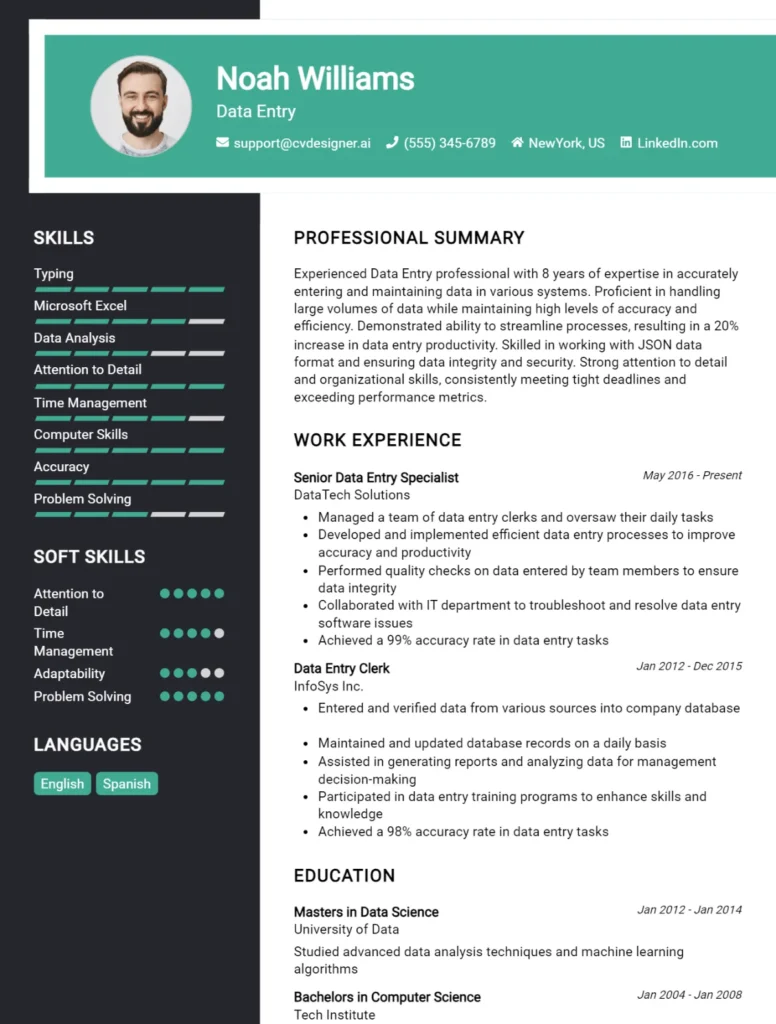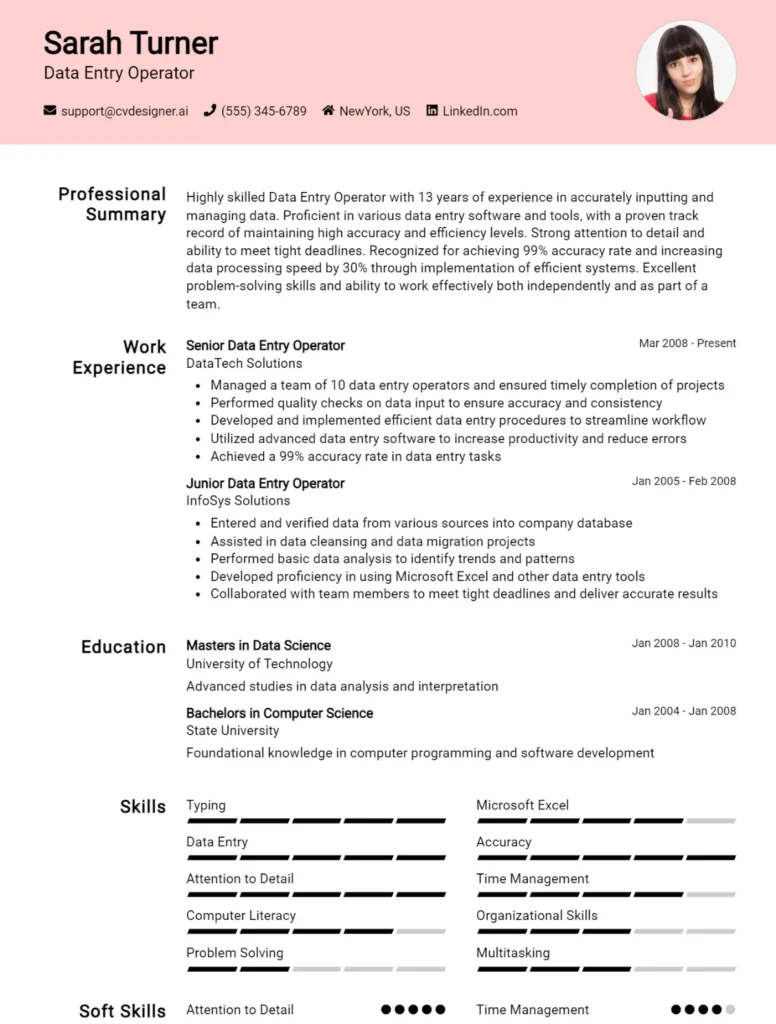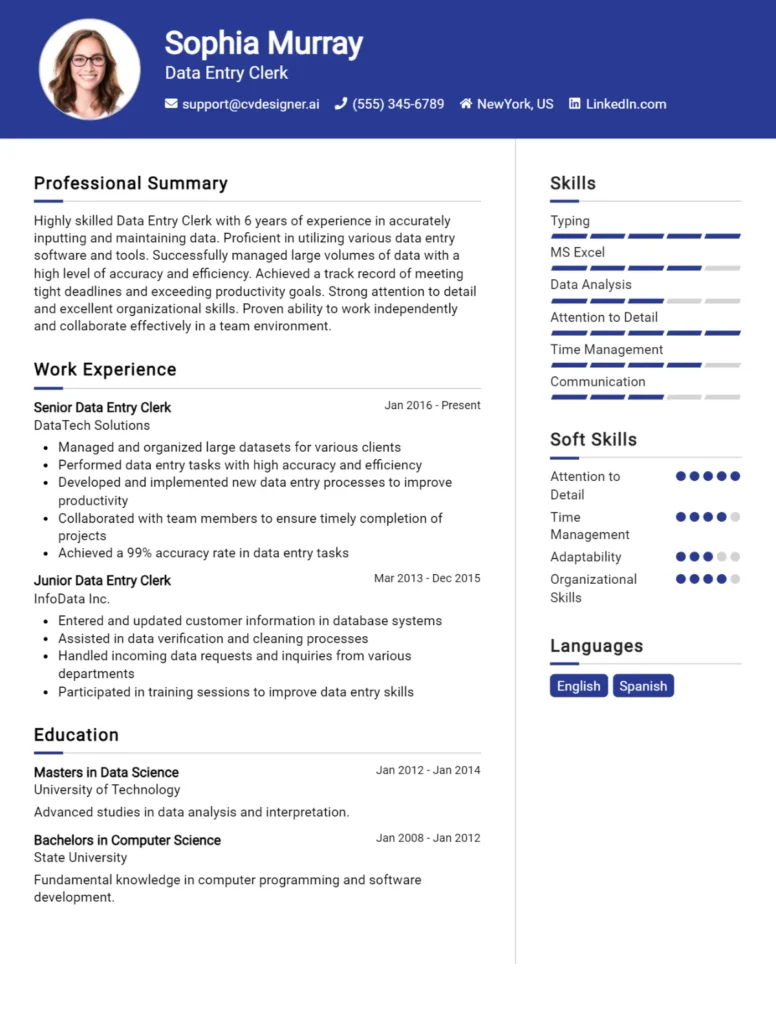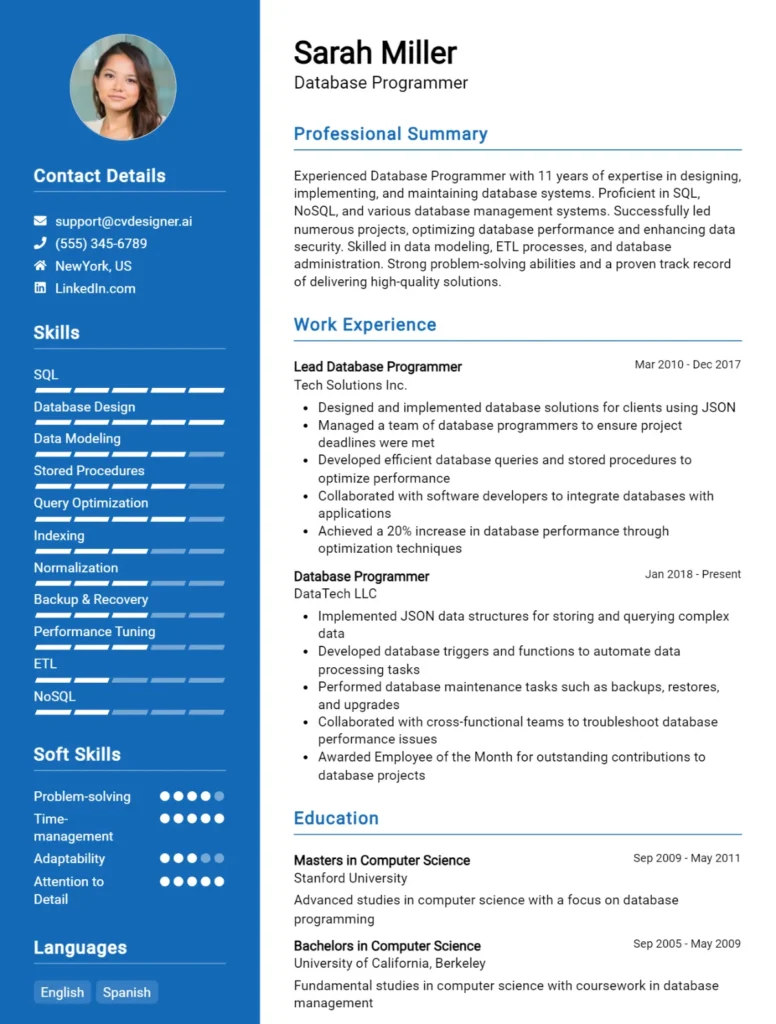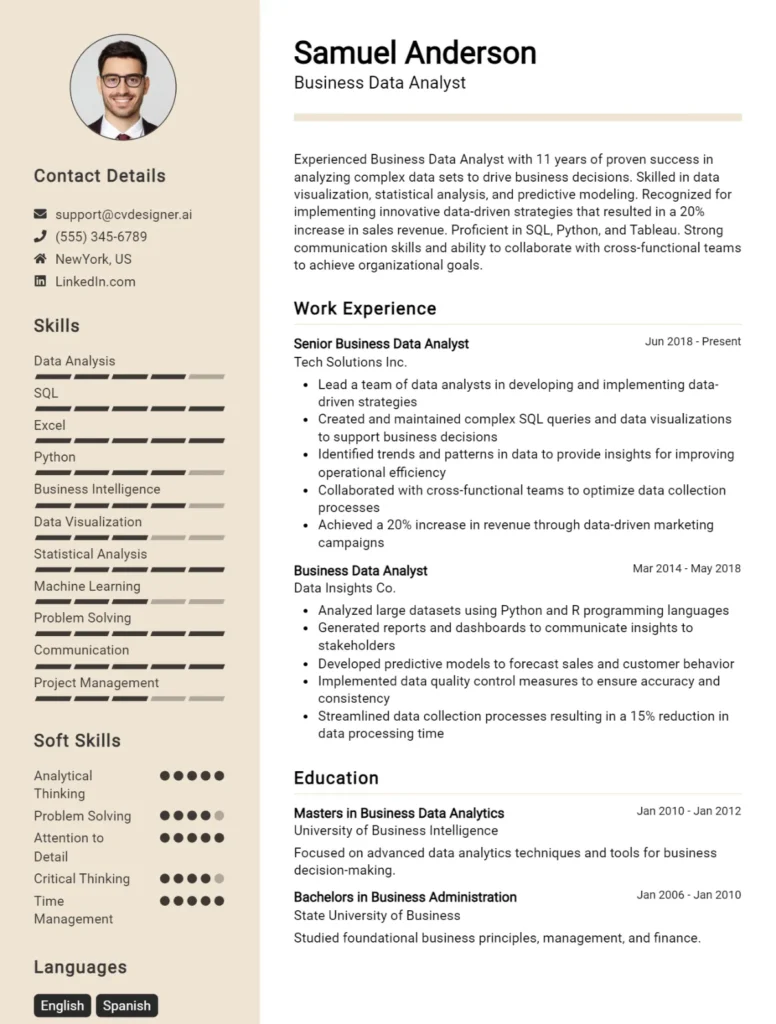Most Popular Data Engineer CV Examples
Explore additional Data Engineer CV samples and guides and see what works for your level of experience or role.
Are you ready to take your career as a Data Engineer to the next level? Crafting a compelling CV is crucial in standing out in today’s competitive job market, especially in a field as dynamic as data engineering. In this guide, we’ll walk you through the essential steps to create a winning CV that showcases your skills, experience, and potential. By the end of this article, you’ll be equipped with valuable insights and a practical example to help you create a CV that captures attention from recruiters. Here’s what you can expect to learn:
- Understanding the Key Components: Essential sections to include in your CV for maximum impact.
- Highlighting Relevant Skills: How to effectively showcase your technical and soft skills.
- Structuring Your Experience: Tips for presenting your work history in a way that tells your career story.
- Utilizing Keywords: The importance of industry-specific terminology to pass through ATS (Applicant Tracking Systems).
- Formatting for Readability: Best practices for layout and design to ensure your CV is easy to read and visually appealing.
- Common Mistakes to Avoid: Pitfalls that can undermine your CV and how to steer clear of them.
- Example CV: A detailed example of a well-crafted Data Engineer CV to serve as inspiration.
Dive in and unlock the secrets to writing an impressive Data Engineer CV that opens doors to new opportunities!
What is a Data Engineer CV?
A Data Engineer CV serves as a critical tool for showcasing an individual's skills, experiences, and accomplishments in the field of data engineering. This document not only highlights technical proficiencies, such as expertise in data warehousing, ETL processes, and programming languages like Python or SQL, but also emphasizes the ability to design and build scalable data pipelines. A well-crafted CV is essential for capturing the attention of potential employers, as it presents a professional narrative that aligns with job requirements and industry standards. For guidance on creating an impactful CV, you can refer to this comprehensive cv writing guide.
The importance of a Data Engineer CV extends beyond mere qualifications; it reflects a candidate's understanding of data architecture and their capacity to solve complex data challenges. In a competitive job market, a strong CV can differentiate a candidate from others, making it crucial to utilize effective design and content strategies. Utilizing a cv maker can simplify this process, allowing aspiring data engineers to create visually appealing and well-structured resumes that effectively communicate their value to potential employers. By investing time in developing a polished CV, data engineers can significantly enhance their job prospects and career trajectory.
Key Components of a Data Engineer CV
- Contact Information: Include your full name, phone number, email address, and LinkedIn profile or personal website.
- Professional Summary: A brief overview highlighting your experience, key skills, and career objectives tailored to the data engineering field.
- Technical Skills: List relevant skills such as programming languages (e.g., Python, SQL, Java), data warehousing solutions, ETL tools, and cloud platforms. For more on essential skills, refer to the linked resource.
- Work Experience: Detail your previous job roles, focusing on relevant projects and responsibilities. Highlight your contributions to data pipeline development, data modeling, and database management. For comprehensive guidance, explore work experience.
- Education: Include your degrees, institutions attended, and graduation dates. Mention any relevant coursework or certifications in data engineering or related fields.
- Certifications: List any professional certifications, such as AWS Certified Data Analytics or Google Cloud Professional Data Engineer, that enhance your credibility.
- Projects: Showcase notable projects that demonstrate your expertise in building data solutions, analytics, or machine learning implementation.
- Tools and Technologies: Mention specific tools and technologies you are proficient in, such as Apache Spark, Hadoop, Kafka, or Tableau.
- Soft Skills: Highlight essential soft skills like problem-solving, communication, teamwork, and adaptability, which are important in collaborative data engineering environments.
- Publications or Contributions: If applicable, include any relevant articles, blogs, or conference presentations you've contributed to in the field of data engineering.
- Professional Affiliations: Mention memberships in professional organizations related to data science or engineering, which can reflect your commitment to the field.
- References: Optionally, include references or state that they are available upon request.
Sample Data Engineer CV for Inspiration
John Doe
123 Data Lane
San Francisco, CA 94105
(123) 456-7890
john.doe@email.com
LinkedIn: linkedin.com/in/johndoe
GitHub: github.com/johndoe
Professional Summary
Detail-oriented Data Engineer with over 5 years of experience in designing, building, and maintaining scalable data pipelines and data warehouses. Proficient in ETL processes, data modeling, and cloud-based technologies. Strong analytical skills with a passion for transforming complex data into actionable insights to drive business decisions. Adept at collaborating with cross-functional teams to deliver data solutions that meet organizational needs.
Work Experience
Data Engineer
ABC Tech Solutions, San Francisco, CA
June 2020 – Present
- Designed and implemented ETL pipelines to ingest and transform large datasets from various sources into a centralized data warehouse using Apache Spark and AWS Glue.
- Developed data models and schemas to support analytics and reporting needs, ensuring data integrity and optimizing performance.
- Collaborated with data scientists and analysts to understand data requirements and provided insights to improve data accuracy and availability.
- Automated data quality checks and monitoring processes, reducing data discrepancies by 30%.
- Led the migration of on-premises data infrastructure to AWS cloud, resulting in a 40% cost reduction in data storage and processing.
Junior Data Engineer
XYZ Data Corp, San Francisco, CA
May 2018 – May 2020
- Assisted in the development of data pipelines using Python and SQL for data extraction, transformation, and loading into PostgreSQL databases.
- Supported data integration projects by collaborating with stakeholders to gather requirements and implement solutions for data accessibility.
- Conducted data profiling and cleansing to improve data quality for analytics and reporting purposes.
- Developed and maintained documentation for data workflows, ensuring compliance with internal data governance policies.
Intern Data Analyst
Data Insights, San Francisco, CA
June 2017 – April 2018
- Analyzed datasets to identify trends and patterns, providing actionable insights to improve marketing strategies.
- Created dashboards and visualizations using Tableau to present findings to stakeholders.
- Assisted in data cleaning and preprocessing tasks to prepare datasets for analysis.
Education
Bachelor of Science in Computer Science
University of California, Berkeley, CA
Graduated: May 2017
Skills
- Programming Languages: Python, SQL, Java
- Big Data Technologies: Apache Spark, Hadoop
- Data Warehousing: Amazon Redshift, Google BigQuery, Snowflake
- ETL Tools: Apache Airflow, Talend, AWS Glue
- Database Management: PostgreSQL, MySQL, MongoDB
- Cloud Platforms: AWS, Google Cloud Platform
- Data Visualization: Tableau, Power BI
- Version Control: Git
Publications
- Doe, J. (2023). "Optimizing Data Pipelines for Real-Time Analytics." Journal of Data Engineering, 15(3), 120-135.
- Doe, J. (2022). "Data Modeling Best Practices for Cloud-Based Solutions." International Conference on Data Science, 23(1), 45-58.
Certifications
- AWS Certified Data Analytics – Specialty
- Google Cloud Professional Data Engineer
- Microsoft Certified: Azure Data Engineer Associate
Data Engineer CV Writing Tips
When crafting a CV as a Data Engineer, it’s essential to highlight both your technical expertise and your ability to extract insights from complex datasets. Start with a clear and concise summary that showcases your experience with data architecture, ETL processes, and big data technologies. Tailor your CV to the job description, emphasizing relevant skills such as programming languages (e.g., Python, Java), database management systems (e.g., SQL, NoSQL), and any experience with cloud platforms. Use quantifiable achievements to demonstrate your impact in previous roles, and make sure to present your information in a well-organized format that is easy to read.
CV Writing Tips for Data Engineers:
- Tailor Your CV: Customize your CV for each job application by aligning your skills and experiences with the specific requirements outlined in the job description.
- Highlight Technical Skills: Clearly list your proficiency in programming languages, database technologies, and data processing frameworks (e.g., Apache Spark, Hadoop) in a dedicated skills section.
- Use Action Verbs: Start bullet points with strong action verbs (e.g., developed, optimized, implemented) to convey your contributions effectively.
- Include Certifications: If you have relevant certifications (e.g., AWS Certified Data Analytics, Google Cloud Professional Data Engineer), be sure to include them to demonstrate your commitment to professional development.
- Showcase Projects: Describe specific projects or initiatives where you utilized your data engineering skills, including any challenges faced and how you overcame them.
- Quantify Your Impact: Whenever possible, use numbers to quantify your achievements (e.g., “Reduced data processing time by 30%” or “Managed a database with over 1 million records”).
- Keep It Concise: Aim for a CV length of one to two pages, focusing on the most relevant experiences and skills to keep the reader engaged.
- Proofread: Ensure your CV is free from grammatical errors and typos; consider having a peer review it for clarity and professionalism.
Data Engineer CV Summary Examples
As a Data Engineer, crafting a compelling CV summary is crucial to highlight your skills and experience in handling complex data systems and architectures. Here are several examples that effectively communicate your expertise and value to potential employers.
Detail-oriented Data Engineer with over 5 years of experience in designing, building, and maintaining scalable data pipelines. Proficient in SQL, Python, and Big Data technologies, with a strong ability to leverage data for strategic decision-making.
Results-driven Data Engineer skilled in ETL processes and data warehousing solutions. Adept at working with cloud platforms such as AWS and Azure, and passionate about implementing data solutions that drive business insights and efficiencies.
Innovative Data Engineer with a solid foundation in database management and data modeling. Experienced in optimizing data workflows and enhancing data quality, with a proven track record of delivering insights through advanced analytics.
Experienced Data Engineer with expertise in machine learning and data analytics. Strong background in developing data architecture and collaborating with cross-functional teams to drive data-driven strategies that improve performance and customer experience.
Proficient Data Engineer with a comprehensive understanding of data integration techniques and tools. Committed to creating robust data solutions that empower organizations to harness the power of their data for competitive advantage.
Build a Strong Experience Section for Your Data Engineer CV
As a Data Engineer, showcasing your work experience effectively can set you apart from other candidates. The experience section of your CV should highlight your technical skills, project contributions, and the impact of your work on the organization. Below are several examples that illustrate strong work experience descriptions for a Data Engineer role:
- Developed and maintained ETL pipelines using Apache Spark and Python, resulting in a 30% reduction in data processing time and improved data quality for analytics teams.
- Collaborated with data scientists to design and implement a data warehouse on AWS Redshift, enhancing data accessibility and enabling real-time analytics for business intelligence.
- Automated data ingestion processes using Apache Kafka, leading to a 50% increase in data flow efficiency and providing timely insights for cross-functional teams.
- Engineered and optimized database systems using SQL and NoSQL technologies, which improved query performance by 40% and supported high-volume data transactions.
- Implemented data governance protocols and data quality checks to ensure compliance with industry standards, significantly reducing data discrepancies and enhancing trust in analytics.
- Designed a scalable data architecture for a cloud-based solution, facilitating the integration of diverse data sources and enabling seamless reporting for stakeholders.
- Led a team in migrating legacy data systems to a modern cloud environment, resulting in cost savings of 20% and improved system reliability and performance.
- Conducted performance tuning and optimization of existing data pipelines, achieving a 25% improvement in processing speeds and enhancing overall system efficiency.
Data Engineer CV Education Examples
As a Data Engineer, having a solid educational background is crucial for success in the field. Candidates often come from a variety of academic disciplines that equip them with the technical skills and knowledge necessary to manage and optimize data systems. Below are several relevant educational backgrounds that can enhance a Data Engineer's qualifications:
- Bachelor’s Degree in Computer Science: This degree provides a strong foundation in programming, algorithms, and data structures, which are essential for building and maintaining data pipelines.
- Bachelor’s Degree in Information Technology: Focused on the application of technology in business, this degree covers networking, databases, and systems management, all of which are critical for effective data engineering.
- Bachelor’s Degree in Data Science: Combining statistics, data analysis, and programming, this degree offers a comprehensive understanding of how to work with data, making it highly relevant for data engineering roles.
- Master’s Degree in Data Engineering or Big Data: Advanced studies in this area delve deeper into data architecture, distributed systems, and data warehousing, preparing graduates for complex data challenges.
- Bachelor’s Degree in Mathematics or Statistics: A strong background in math and statistical methods is beneficial for data modeling and analysis, providing a solid analytical foundation for a data engineering career.
Skills to Highlight in Your Data Engineer CV
As a Data Engineer, your role is crucial in managing and optimizing the flow of data within an organization. To stand out in this competitive field, it's essential to showcase a well-rounded skill set that includes both technical proficiencies and interpersonal abilities. Below is a list of key soft and hard skills that should be highlighted in your CV to demonstrate your capability in handling data infrastructure and collaborating effectively with teams.
Soft Skills:
- Problem-Solving: Ability to analyze issues and devise effective solutions.
- Communication: Strong verbal and written skills to convey complex data concepts clearly.
- Teamwork: Ability to collaborate with data scientists, analysts, and other stakeholders.
- Adaptability: Flexibility to learn new tools and technologies as they emerge.
- Attention to Detail: Precision in data handling and analysis to ensure accuracy.
- Time Management: Skillful in prioritizing tasks to meet project deadlines.
- Critical Thinking: Ability to evaluate information and make informed decisions.
- Creativity: Innovative approach to designing data systems and workflows.
- Emotional Intelligence: Understanding and managing interpersonal dynamics within a team.
- Leadership: Capability to guide projects and mentor junior team members.
Hard Skills:
- SQL: Proficiency in writing complex queries for data manipulation and retrieval.
- Data Warehousing: Knowledge of data storage solutions and architecture.
- ETL Processes: Experience with Extract, Transform, Load processes for data integration.
- Programming Languages: Proficiency in languages such as Python, Java, or Scala.
- Big Data Technologies: Familiarity with tools like Hadoop, Spark, and Kafka.
- Cloud Platforms: Experience with AWS, Google Cloud, or Azure for data solutions.
- Database Management: Knowledge of databases like MySQL, PostgreSQL, or MongoDB.
- Data Modeling: Ability to design data models and schemas for efficient data storage.
- Version Control: Proficiency in using Git for code management and collaboration.
- Data Visualization: Skills in tools like Tableau or Power BI to present data insights.
Data Engineer CV Format
When crafting a CV for a Data Engineer position, it's vital to present your skills and experience in a clear and organized manner. The best format will vary depending on your career level—entry-level, mid-level, or senior-level. A well-structured CV can effectively showcase your technical abilities, project experience, and contributions to data-driven initiatives.
For entry-level positions, a functional format highlighting relevant skills and academic projects is ideal. Mid-level professionals might benefit from a chronological format that emphasizes work history and achievements, while senior-level candidates should focus on a combination format that showcases leadership experience and significant contributions to data architecture and strategy.
- Start with a strong summary statement that captures your core competencies and career goals.
- Use clear headings to separate sections such as Experience, Skills, Education, and Certifications.
- Include quantifiable achievements to demonstrate the impact of your work, such as performance improvements or cost reductions.
- Tailor your CV to the job description, using relevant keywords and phrases to pass through Applicant Tracking Systems (ATS).
- Highlight your proficiency in tools and technologies specific to data engineering, such as SQL, Python, Hadoop, or cloud platforms.
- Keep the design clean and professional, ensuring readability and easy navigation through the document.
For more detailed guidance on CV formats, refer to this cv format.
Common Mistakes to Avoid in a Data Engineer CV
When crafting a CV for a Data Engineer position, it's essential to present your skills and experience in a clear and compelling manner. A well-structured CV not only highlights your technical abilities but also demonstrates your understanding of the role and its requirements. However, many candidates often make common mistakes that can detract from their overall presentation. Here are some pitfalls to avoid when preparing your Data Engineer CV:
- Lack of Tailoring: Failing to customize your CV for the specific job description can make it seem generic and unengaging.
- Overloading with Technical Jargon: While technical skills are crucial, excessive jargon can alienate readers who may not be familiar with specific terms.
- Neglecting Soft Skills: Ignoring the importance of teamwork, communication, and problem-solving skills can leave a gap in your qualifications.
- Using a One-Size-Fits-All Format: A CV that doesn't follow a clear structure can confuse potential employers. Ensure your format is logical and easy to navigate.
- Omitting Relevant Projects: Not including key projects that showcase your data engineering skills can diminish your credibility.
- Failing to Quantify Achievements: Instead of just listing tasks, use metrics to demonstrate the impact of your work, such as performance improvements or successful project outcomes.
- Inconsistent Formatting: Inconsistent font sizes, styles, or bullet points can detract from the professionalism of your CV.
- Ignoring Keywords: Not incorporating relevant keywords from the job description can hinder your CV from passing through Applicant Tracking Systems (ATS).
- Using Passive Language: Passive language can make your contributions sound less impactful. Use active verbs to convey a sense of ownership and initiative.
- Inadequate Proofreading: Spelling and grammatical errors can undermine your professionalism, so thorough proofreading is essential before submission.
Key Takeaways for a Data Engineer CV
- Tailor Your CV: Customize your CV for each job application, highlighting relevant skills and experiences that align with the job description.
- Clear Job Title: Use a clear and specific job title such as "Data Engineer" at the top of your CV to make your role evident to recruiters.
- Professional Summary: Write a succinct professional summary that outlines your experience, strengths, and what you bring to the role.
- Technical Skills: List key technical skills relevant to data engineering, such as SQL, Python, ETL tools, data warehousing, and cloud services (AWS, Azure, GCP).
- Project Experience: Include specific projects you've worked on, detailing your role and the technologies used. Quantify your achievements with metrics when possible.
- Education & Certifications: Highlight your educational background and any relevant certifications (e.g., Google Cloud Professional Data Engineer, AWS Certified Data Analytics).
- Tools & Technologies: Mention the data tools and technologies you are proficient in (e.g., Hadoop, Spark, Kafka), as these are crucial for a Data Engineer role.
- Soft Skills: Include soft skills that are relevant to the job, such as teamwork, problem-solving, and communication abilities.
- CV Format: Choose a professional CV format that enhances readability. Consider using cv templates to find a suitable design.
- Cover Letter: Don’t forget to pair your CV with a compelling cover letter. Explore cover letter templates to help structure your letter effectively.
- Use a CV Builder: To create a polished CV quickly, utilize a cv builder that offers easy customization and formatting options.
- Proofread: Ensure there are no spelling or grammatical errors. A well-presented CV reflects attention to detail, which is essential in data engineering.
Build your CV in minutes
Use an AI-powered cv builder and have your cv done in 5 minutes. Just select your template and our software will guide you through the process.
